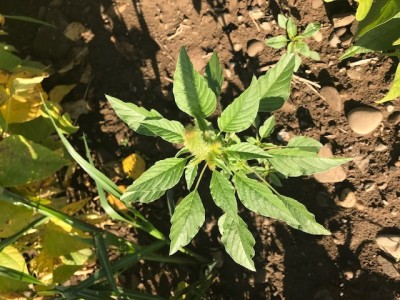Palmer Amaranth Confirmed in Southwest New York
Joshua Putman, Field Crops and Forage Specialist
Southwest New York Dairy, Livestock and Field Crops Program

Palmer amaranth (Amaranthus palmeri) is a serious problem for many growers throughout the United States because of its competitiveness and effect on agricultural production. Palmer amaranth is commonly confused with other pigweeds and is often difficult to identify in the early stages of growth. Much of the Palmer amaranth in the United States is resistant to several classes of herbicides such as glyphosate, and it's common for many of these to be resistant to ALS-inhibiting herbicides such as Pursuit and Classic.
Earlier this fall, it was noticed in two dry bean and several soybean production fields in Steuben County. This is the second population of Palmer amaranth to be found in New York, but is the first population to be found in a crop production setting. The fields are located along a high traffic roadway where it's possible that the specimens came in on a tractor trailer or piece of machinery. It is important to know the biology of Palmer amaranth to avoid its potential to spread to surrounding counties.
Palmer amaranth is aggressive as it competes for nutrients, sunlight, and water. Palmer amaranth has dioecious reproduction, so individual plants are either male or female, which forces outcrossing and genetic diversity. Under ideal conditions, Palmer amaranth can grow 2-3 inches per day and within a few months of emergence, can reach heights of 6-8 feet. It is a highly prolific seed producer in that it can produce 100,000-600,000 seeds per female plant. The seed is also very small and can be transported via machinery, mud, or travel on the bottom of your shoe. As the plant matures, it forms a poinsettia appearance and is a key characteristic for identification. It has been found that the presence of this weed species can double or triple your cost of management on the farm. If you suspect you have this weed species, please contact your local specialist or CCE office for correct identification and management. You may also see the link below for more information.
Upcoming Events
WEBINAR - Automated Milking Systems Efficiency: Balancing Focus on Individual Cows and System Optimization
May 8, 2024
Please join Cornell the SWNY team and MSU Extension for our talk with Dr. Pablo Silva Boloña on improving efficiency of Automated milking systems by focusing on milking settings for individual and group success.
Broiler Field Day at Sunny Cove Farm
June 6, 2024
Alfred Station, NY
Join us for a field day to explore broiler production, processing, and finances. Meghan Snyder of Sunny Cove Farm will be our host. She raises small batches of organic broilers, processing them on-farm under the 1,000 bird exemption.
Stockmanship and Stewardship 2024
October 25, 2024
Hamburg, NY
Save the date!! The event is one of 4 across the US and is a two-day educational experience featuring low-stress cattle handling demonstrations, Beef Quality Assurance educational sessions, facility design sessions, and industry updates.
Announcements
No announcements at this time.





